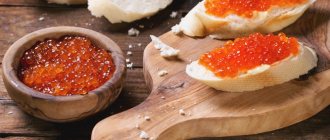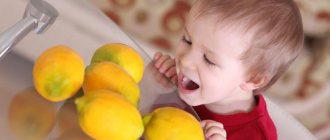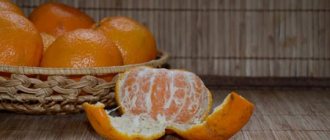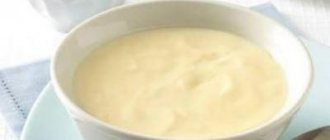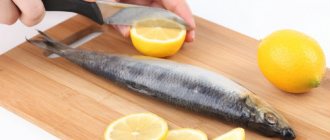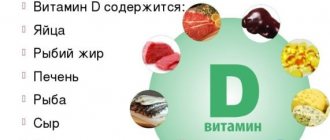Beneficial features
Beetroot is a root vegetable that can be stored for a long time, practically without losing its beneficial properties. During the cold season, it becomes an accessible source of substances necessary for the body.
For children 1 year of age and older, beetroot dishes are healthy due to the high content of insoluble dietary fiber and pectin. Coarse fiber stimulates intestinal contractions and also creates an environment beneficial for beneficial microflora - this helps prevent and treat constipation and dysbiosis.
Due to the predominance of pectin over insoluble fiber, beet dishes have a laxative effect, but do not provoke abdominal pain and increased gas formation. Pectin helps the gastrointestinal tract cleanse itself of toxins, heavy metal salts, etc.
Beets are rich in ascorbic acid, B vitamins, PP, and contain a set of micro- and macroelements, including iron and iodine, which contribute to the proper development of a child in 1 year of life. Regular consumption of dishes from this root vegetable is useful for the prevention and treatment of iodine deficiency, anemia, and hypovitaminosis.
Beets owe their bright color to their high content of betaine, a biologically active substance that is necessary for a number of processes in the body, including the metabolism of fats and proteins. In addition, betaine protects the baby's liver.
The benefits of beets for children's bodies
However, there is no need to be afraid. The child grows, develops, his body gets stronger day by day and quite successfully learns to deal with harmful substances. You shouldn’t be too zealous in protecting your child from everything bad - otherwise the body will never learn to withstand the danger, and as a result, even a common cold will knock the child down.
So, what are the benefits of beets for children? First of all, the root vegetable is useful because it contains folic acid, which is very useful for both children and adults, iron necessary for normal blood flow, calcium, which helps in the formation and strengthening of bones and teeth, as well as magnesium. In addition, beets are rich in vitamins A, E, K, C.
But the list of useful substances does not end there. The red vegetable contains antioxidants that have a direct effect on the development of children's immunity. And when rubbed through a fine grater, it can replace a chemical laxative. Beetroot juice has a positive effect on the functioning of the brain, promotes its activity and development. Fiber not only energetically removes various toxins from the body, but also helps the gastrointestinal tract function.
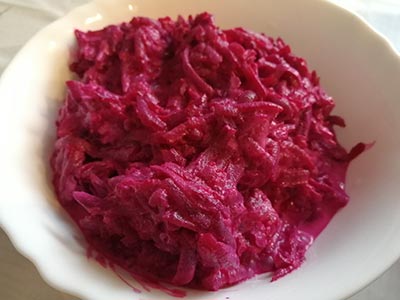
For a one-year-old child, beets can be ground into a paste.
Beets contain micronutrients necessary for the human body. The root vegetable has stable qualities during storage, which gives it advantages for use in winter and spring.
We suggest you read: Spinach – benefits and harms for the human body, can it be eaten raw, how to eat it?
For children who are six months old, the vitamins contained in beets will be useful:
- fiber, which normalizes the metabolic process and increases appetite;
- a number of vitamins: A, C, E, K;
- folic acid;
- calcium, magnesium, potassium.
Any age, and especially a child’s body, needs such a set of useful minerals.
Antioxidants in beets help strengthen vascular walls, affect mental development and strengthen the nervous system. The plant compound betaine serves as a protector for the liver and adrenal glands. Pectins allow children suffering from constipation to cleanse the body.
Harmful properties of root vegetables
How dangerous are beet dishes for a child? Pediatricians recommend treating this root vegetable with caution because:
- beets actively absorb nitrates from the soil, and if you use unsafe vegetables from your garden to prepare complementary foods, your baby may receive serious poisoning from harmful substances;
- root juice can cause allergies;
- the laxative effect can result in diarrhea in a newborn, since his gastrointestinal tract is not yet ready to digest such food.
Fresh beet juice is contraindicated for children in the first years of life. It contains a high concentration of fruit acids, which will cause the newborn to irritate the sensitive walls of the stomach and intestines. Freshly squeezed juice does not undergo heat treatment, which is why it may contain large quantities of nitrates.
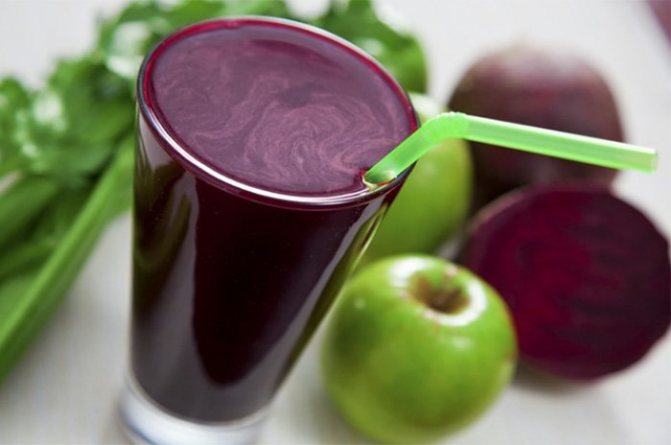
For children over 1 year of age who are prone to constipation, pediatricians prescribe diluted beetroot juice, limiting the daily volume of the drink - no more than 60 ml is allowed.
To eliminate the risk of nitrate poisoning, root vegetables should be selected and prepared correctly.
Beetroot borscht
At what age can a child be given beets in the form of juice? In this state, the root vegetable can be offered to the baby at another three months, if necessary. As you know, beets are an excellent laxative. That is why its use is the safest medicine for constipation.
It is worth considering that at this age, beet juice should be made exclusively from well-cooked vegetables. Squeeze a few drops of the red product into milk, water or any drink that your baby is already used to drinking.
Juice from raw root vegetables can only be given to children after seven years of age. This is explained by the fact that beets absorb all nitrates and harmful substances from the soil. They disappear during cooking.
At what age can a child be offered beets in borscht and other types of liquid dishes?
Before consuming such soups, it is necessary to check the child’s reaction to this root vegetable. That is why you need to start by adding it to juices or purees. If everything went well and the baby does not have an allergy, you can offer him beetroot borscht.
Put in it only those foods that the child has already tried: meat, potatoes, carrots, cabbage. Typically, such dishes are recommended to be introduced into a child’s diet after one and a half years. You can reduce this age if necessary, but it is not recommended to offer such products before one year of age.
As mentioned above, beet juice has a positive effect on the gastrointestinal tract, and is especially useful for infants suffering from constipation. It is worth noting that beet juice will be preferable to tablets or suspensions.
But we should also not forget that large amounts of juice should not be introduced into a child’s diet at once. It is better to use the “from small to large” method and teach the child gradually. You need to start with just a few drops and gradually increase the dose.
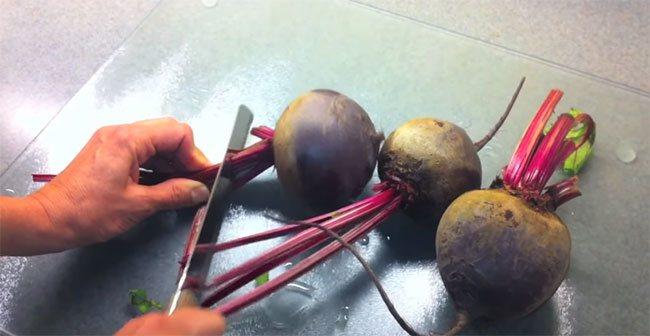
Beetroot juice for infants is prepared very simply: the beets are squeezed in a juicer. But there is a rule here too. The fact is that freshly squeezed juice is not as healthy as it is believed, quite the contrary. Just immediately after squeezing, the juice contains a considerable amount of completely unnecessary essential compounds, which simply disintegrate over time. Therefore, it will not be superfluous to wait 2-3 hours and only then give the juice to the child.
To reduce the irritating effect, beet juice can be mixed with apple or carrot juice, or simply diluted with warm water.
At what age should beet complementary foods be introduced?
Beetroot dishes can be added to the baby’s menu when he reaches eight months of age. By this time, his body has already been adapted to digest coarse fiber and pectin, which are contained in apples, potatoes, zucchini and other foods recommended for first feeding.
For the first time, the baby is given boiled beet puree. Half a teaspoon of this puree is added to the puree of other vegetables, preferably potatoes. The baby still has to get used to the taste of beets in their pure form; they may not like it right away.
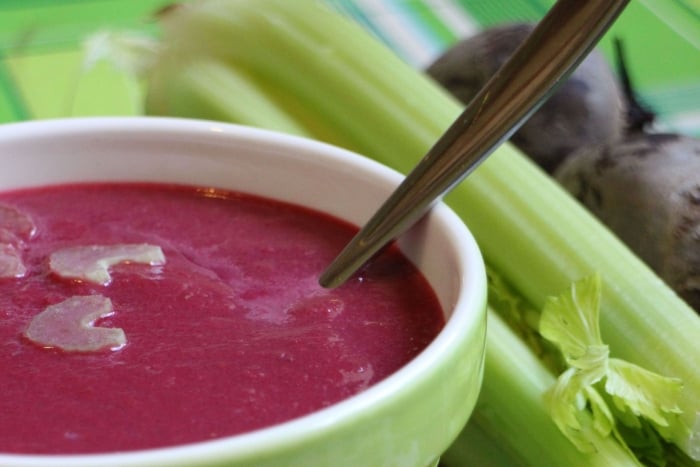
You should experiment with adding beetroot puree to your baby’s usual food in the first half of the day to observe how the baby’s body reacts to the new product. Within two days the following may occur:
- allergic manifestations (redness of mucous membranes, skin rashes);
- indigestion (loose stools);
- abdominal pain (colic, bloating).
These symptoms are a signal to postpone the introduction of beetroot dishes into the diet until the baby is 1 year old or later. During this time, the child’s digestive system will become stronger and the production of necessary enzymes will improve.
If a child under the age of 8 months has difficulties with bowel movements, has weak peristalsis and is tormented by constipation, it is allowed to give beetroot puree from 5-6 months in agreement with the pediatrician.
In a situation where a six-month or one-year-old baby often suffers from diarrhea or intestinal colic, it is advisable not to rush with complementary foods that include beets.
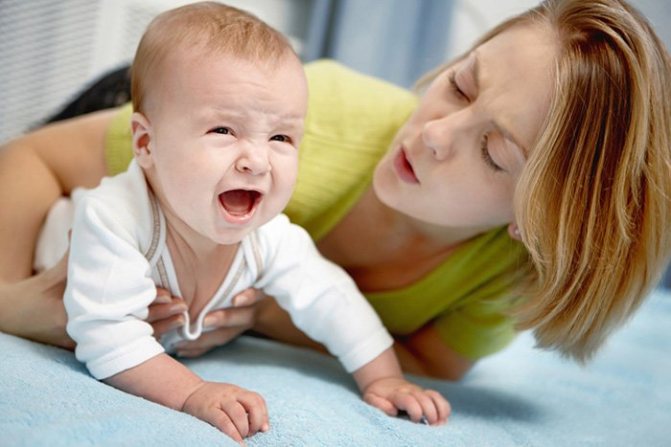
For eight-month-old babies, whose body has successfully coped with the first portion of beets, the serving volume is increased in a few steps to five teaspoons per day, adding half a spoon each time. Puree is given twice a week if the child does not have a tendency to constipation. If you have problems with bowel movements, you can serve dishes with beets more often. From the age of one, a daily serving of beetroot puree of 12 teaspoons is allowed.
How to choose and prepare root vegetables
It is important to take care of the safety of the product for the baby’s health, especially if we are talking about a child of 1 year of age. Dishes should be prepared from root vegetables from your own plot or purchased from people you know well who grow crops for themselves.
If you have to buy beets in a store or market, use a nitrate meter. If you don’t have a device at hand, use the following tips:
- choose small root vegetables - they do not have time to absorb a large amount of nitrates;
- root vegetables should be dense, without dark spots of rot and mold (this indicates improper storage);
- When cut, the root vegetable should have a dark burgundy color, without distinct light veins - this means that the nitrate content is minimal.
Without heat treatment, beets are not only dangerous due to nitrates, but also greatly irritate the digestive organs due to the high concentration of fruit acids. To get rid of the negative properties of the root vegetable and reduce the risk of allergies, it is boiled.
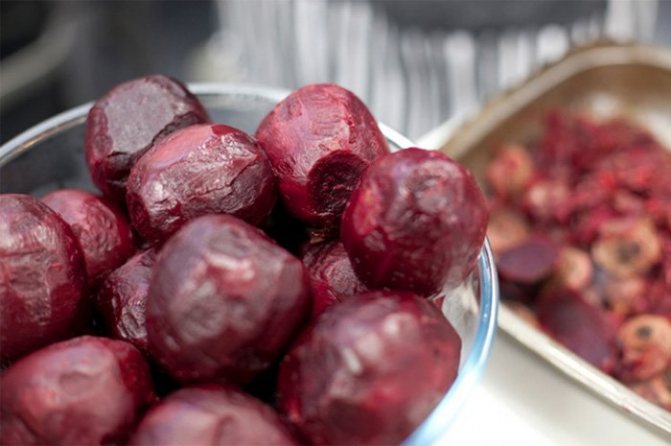
When cooking beets, some of the vitamins are destroyed, but at the same time:
- betaine, coarse fiber and pectin, magnesium, iron and other beneficial substances are preserved;
- nitrates almost completely go into the water;
- the content of fruit acids decreases.
To properly cook beets, you need:
- cut off the top part of a small root crop - this is where the bulk of the nitrates accumulate;
- immerse it in boiling, non-salted water (the vegetable cooks longer in salted water; in addition, complementary foods for babies are not added with salt);
- after 35-40 minutes of cooking, remove the root vegetable from the boiling broth using a slotted spoon and place it in cold water for 20 minutes (if possible, add ice to it).
This cooking method allows you to reduce the cooking time in order to retain more vitamins in the vegetable, while the product will become soft.
Beetroot helps with a runny nose
It turns out that burgundy root vegetables are good for more than just constipation. It can also be used to treat runny noses in children. And although this method seems strange, pediatricians still do not deny the healing properties of beet juice for rhinitis in children.
To prepare ecological nasal drops, you can take raw or boiled beets, rinse and grate them, then carefully squeeze out the juice through cheesecloth. Dilute the juice with clean water in a ratio of approximately 1 to 1. Place 2 drops in the baby’s nose 4 times a day.
Do not forget that allergic rhinitis in children cannot be treated with beet juice - it can only make it worse.
Tags: infant, possible, child, beets
About the author: admin4ik
« Previous entry
Beetroot dishes for children
Children are given beets only in combination with other products, so as not to provoke gastrointestinal irritation. In a dish prepared for a child, beets should account for no more than 30% of the total volume.
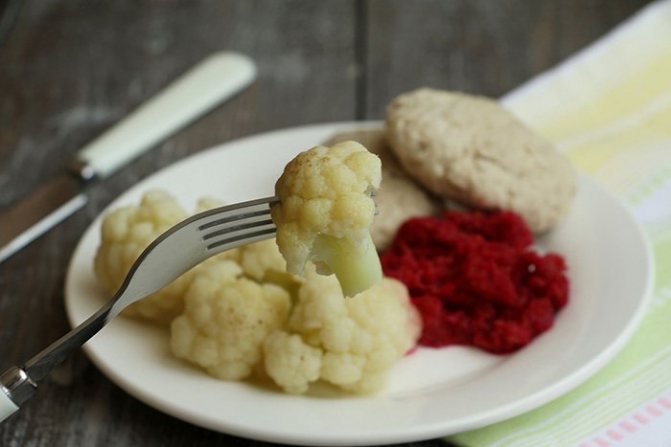
This vegetable is mixed with pureed cabbage, pumpkin, potatoes, zucchini or zucchini. If desired, add lean minced meat or chicken. Manufacturers offer meat and vegetable purees for baby food, which include beets.
Starting from the age of one year, the menu of beet dishes is expanded, introducing:
- salads, including vinaigrette;
- vegetable pancakes or cutlets;
- stew;
- casseroles;
- soups (borscht, children's beetroot soup).
Please note that multi-component dishes are prepared only from those products that the baby’s body has managed to get used to. Preference should be given to boiled, steamed or baked dishes. It is important to limit the amount of salt and choose spices that are safe for the baby (dry dill, parsley).
Beets are included in many dishes recommended for a healthy diet.
Its effect on the body is therapeutic and regulates the child’s digestion process. Subscribe to our VKontakte group
